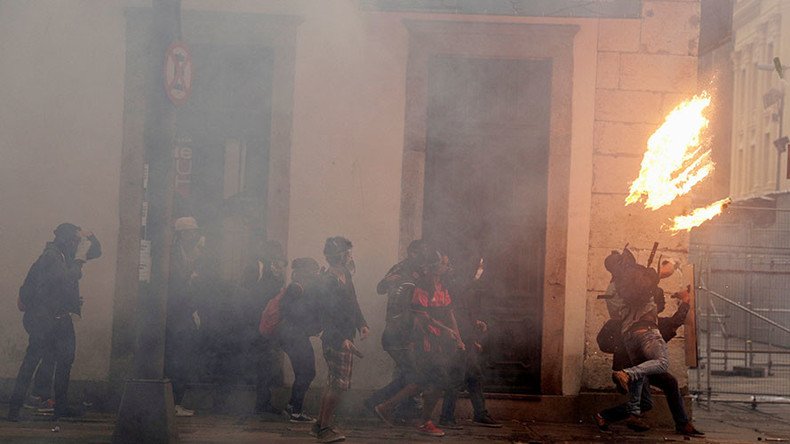Anti-austerity protesters clash with police, block roads, start fires in Rio (VIDEOS, PHOTOS)

Clashes have broken out between workers protesting austerity and police in Rio de Janeiro, Brazil. Demonstrators blocked roads, started fires and threw projectiles at police, who responded with water cannons and tear gas.
Thousands of Brazilians joined numerous protests held across the country. One of the largest demonstrations was staged in front Rio de Janeiro's state assembly. It ended up in clashes between the protesters and police that tried to disperse the crowd, AP reports.
Protesters erected barricades across the roads and are burning office furniture and tyres. Some rally participants also threw projectiles at riot police. In response, police deployed water cannons against the demonstrators.
#Brazil: Police crackdown near the Temer's residence in #SãoPaulo. #GreveGeral#BrasilEmGreve#strikepic.twitter.com/wATZnW5dzS
— ubique (@PersonalEscrito) April 29, 2017
PM dispersa ato diante da residencia de Temer pic.twitter.com/C1hrQ8AaZz
— Carlos Latuff (@LatuffCartoons) April 28, 2017
Clouds of smoke, likely from tear gas, were seen in the center of Rio. Riot police were also filmed using smoke grenades against protesters in the city.
Rio de Janeiro: Policiais do Batalhão de Choque atiram bombas contra os manifestantes na Av. Rio Branco. #grevegeral#BrasilemGrevepic.twitter.com/NfFzSjdvy5
— The Intercept Brasil (@TheInterceptBr) April 28, 2017
Public transport mostly came to a halt across Brazil as the protesters blocked roads and clashed with police at the streets of major cities. In Sao Paulo, most commuter trains and metro lines were stopped. The metro was also closed in the Brazilian capital of Brasilia.
Rio de Janeiro: Na rua Primeiro de Março, um grupo de manifestantes ateia fogo em cadeiras e tapumes. #grevegeral#BrasilemGreve (@erickdau) pic.twitter.com/cH71h7ICVK
— The Intercept Brasil (@TheInterceptBr) April 28, 2017
The general strike was the first in two decades in Brazil. Millions of Brazilians stayed at home Friday, according to the strike organizers. Some 40 million people joined the action, TASS reports.
Workers protested freezes on public spending and changes to pensions and job protection.
#BrasilEmGrevepic.twitter.com/NhQg1OmZA3
— Rômulo Silva (@camisa10romulo) April 28, 2017
"It is going to be the biggest strike in the history of Brazil," Paulo Pereira da Silva, the president of trade union group Forca Sindical, said, Reuters reported.
Tram lines blocked in centre of Rio de Janeiro. #BrasilEmgreve#Riopic.twitter.com/PzlhZGqrbE
— Dude (@jaraparilla) April 28, 2017
In Sao Paulo, protesters blocked the main road leading to the airport.
#Brazil: Main access road to Guarulhos Airport is blocked by protesters in #SãoPaulo. #strike#BrasilEmGreve#GreveGeral 📷 @MidiaNINJApic.twitter.com/YfPfZ4UlVk
— ubique (@PersonalEscrito) April 28, 2017
Brazilian Indians also joined the demonstrations.
The entire country has stopped today to protest neoliberal reforms and coup d'etat 2016. #BrasilEmGreve#GreveGeralpic.twitter.com/O7yMdo9rL7
— Anna Kaiowa (@annakaiowa) April 28, 2017
#BrasilemGreve Brazilian Indians in demonstrations pic.twitter.com/cRauJdCvMP
— Alberto Tufaile (@Albertotufaile) April 28, 2017
Brazil’s first nationwide strike in 21 years was sparked by President Michel Temer's reform bill, which aims to lower wages and erode the power of unions in an effort to boost the economy's crippling rescission and counteract rising unemployment.
Workers' groups claim the cuts are too severe and that more than 14 million people are out of work in Brazil, according to government statistics released on Friday.












